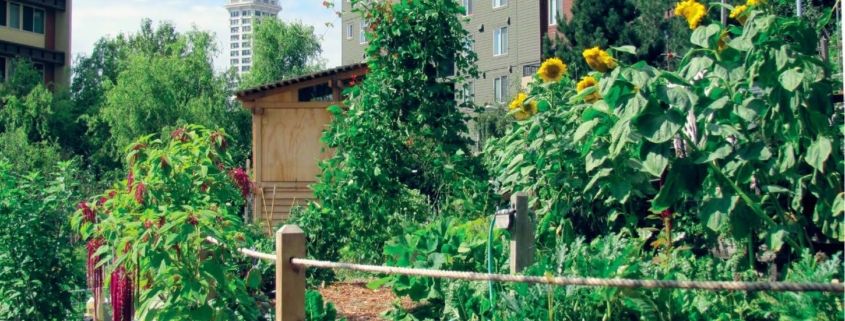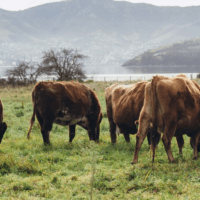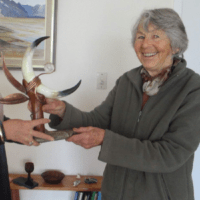Farm Individuality – New Perspective for Urban Farm Growers
Harvest Magazine Article – Spring 2018
Farm individuality is an important principle in biodynamic food growing. Individuality can also be applied in urban food growing spaces of any scale, but there are some changes needed in how to work with individuality, some new perspectives. Article by Peter Kearney.
I had the pleasure of running a workshop recently at the global centre for biodynamics in Dornach, Switzerland at the Goetheanum. It was the 2018 international biodynamic conference. The workshop I ran was focused on working with biodynamic preparations in the urban food growing context. Farm individuality was discussed and a number of the perspectives described below evolved from our conversations.
Background on Farm Individuality
Rudolf Steiner, the founder of biodynamic agriculture, first raised the term ‘farm individuality’ in his Agriculture lectures in 1924. He discussed the ‘farm organism’, expressing how mineral, plant, animals, human beings, land history, climate and connection to cosmic cycles are all part of a system. If brought together in a dynamic way, they interact positively to express the farm’s unique potential or ‘farm individuality.’
Biodynamic farmers work towards balancing the soil and creating a farm individuality that is a self-sustaining whole, where fertility and feed come from within the farm rather than rom outside. This closed loop system incorporates an ideal balance of animals and plant life, creating environmental and economic benefits.
For chemical farmers, it’s obvious they do not have a closed loop system. For organic farmers seeking high levels of productivity, having the right balance of animals to recycle organic matter into crops is often challenging. For biodynamic farmers, the biodynamic preparations are a potent help, but challenges remain. Farm individuality is a concept designed for farmers to strive towards.
Benefits of using farm individuality
- Sustainable soil improvement
- Improved plant and animal vitality
- Reduced impact from crop pests and diseases
- Reduced costs of operation due to fewer external
- Higher quality crops and more consistent yield
Farm or garden individuality for urban food growers
For urban farmers and gardeners, the challenge with inputs and resources on site is amplified, especially regarding animals and their manure being recycled into the soil.
Farm organism vs. farm individuality: What is the difference?
Biodynamic farmer Steffen Schneider, of Hawthorne Valley Farm in New York state, distinguishes the two concepts as follows:
“The term ‘farm organism’… describes the necessary conditions of establishing and/or maintaining ecological connections (between cropping and livestock and between the cultivated and non-cultivated areas) in order to create a self-sustaining and farm-based fertility cycle on our farms.
“The term ‘farm individuality’ points to the possibility that those processes and relationships can set the stage for an ‘Earth biographical development’ by synergizing the inherent diversity into complexity. Think of the unfolding of the unique individuality that happens over the course of a human biography. On the land, through agriculture, it is possible to enable a spiritual being to connect with the growing natural-human- plant-animal-organism, until it has fully expressed itself, becoming a living function of its unified intention and identifiable by its unique ‘skin’. Expressions like terroir and genus loci are evidence that such dynamic possibilities exist. Rudolf Steiner pointed out in his lectures that it is only through this striving toward individual expression that agriculture can unfold and achieve its essential nature, thereby both supporting the evolving Earth to realize her destiny and providing the foundation for truly health-giving and nourishing food.”
– Steffen Schneider, “Imagining Biodynamic Foodsheds of the Future,” Biodynamics (US Biodynamic Association), Winter 2018.
What are possible new perspectives on individuality for urban situations?
- Farm/garden location
- The boundary of the farm or garden organism can be extended to include the neighbourhood or city, for example:
- Green waste sourced from the neighbourhood to make compost
- Using raw materials from a city to be transformed into living matter – for example, using coffee grounds from a large number of cafés in a city to grow mushrooms.
- The boundary of the farm or garden organism can be extended to include the neighbourhood or city, for example:
- External local inputs
- Transform external inputs with biodynamic compost preparations; use clean local green and dry matter.
- Internal inputs
- Use as a resource for food growing and enhance with biodynamic preparations; for example, turn weeds from the garden into a liquid fertiliser.
- Seeds
- Save seeds of plants grown on site, as they are progressively adapting to the local climate, soil and garden management practices. Robustness of crops improves over time with saved non-hybrid seeds.
- Water
- Use water collected on site as much as possible. Design growing spaces to maximise benefit from water usage; thus soil humus becomes a place to store water. Filter town water or recycled water if no water is collected on site.
- Animals
- Use smaller animals such as chickens; create habitats for native beneficial insects and environments where native animals are welcome and become part of the life balance.
- Cultural development
- Connect your growing areas to local people and to the history of the local area. Use spaces to celebrate the food grown and build a local food culture.
- Observation
- Develop exquisite observation skills in your food growing space.
- Consciousness
- It is vital that the gardener develops strong concentration and intention when using the biodynamic preparations, aimed at being mentally present during food growing activities.
The last point above is the most important one. Attitude is everything in life. What is more personal, more reflective of your individual character than how you are when you work in the garden and engage with biodynamic practices?
Peter Kearney is an educator, consultant and mentor who designs and enables food growing spaces and large scale urban farms in Brisbane, Australia. He founded My Food Garden with his wife Vicki. This article was originally published on Peter’s blog at www.myfoodgarden.com.au.



